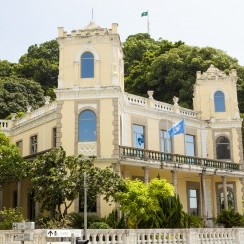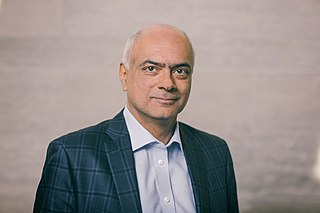
The United Nations University (UNU) is the think tank and academic arm of the United Nations. Headquartered in Shibuya, Tokyo, Japan, with diplomatic status as a UN institution, its mission is to help resolve global issues related to human development and welfare through collaborative research and education.
Maastricht University is a public research university in Maastricht, the Netherlands. Founded in 1976, it is the second youngest of the thirteen Dutch universities.

The United Nations University Institute in Macau, formerly the United Nations University International Institute for Software Technology and then United Nations University Institute on Computing and Society, is a United Nations University global think tank conducting research and training on digital technologies for sustainable development, encouraging data-driven and evidence-based actions and policies to achieve the Sustainable Development Goals. UNU-Macau is located in Macau, China.

The United Nations University - Maastricht Economic and Social Research Institute on Innovation and Technology (UNU-MERIT) is a joint research and training institute of the United Nations University and Maastricht University, with both parent institutions supplying staff. UNU-MERIT is based in Maastricht, in the southeastern part of the Netherlands.

Luc Soete is a Belgian economist. He is a Professor and the Dean of the Brussels School of Governance. He is also a member of the Advisory Board of the University of Sussex Business School and of the Advisory Board of the UNU Institute on Comparative Regional Integration Studies (UNU-CRIS) in Bruges, Belgium. He is a former Rector Magnificus and professor of International Economic Relations at the School of Business and Economics, Maastricht University, and former director of UNU-MERIT, a joint research institute of the United Nations University (UNU) and Maastricht University. Luc Soete is a member of the Dutch scientific advisory body (AWTI) and the Royal Netherlands Academy of Arts and Sciences (KNAW) since 2010. He serves on the Board of Supervisors of the Delft University of Technology.

The United Nations University World Institute for Development Economics Research (UNU-WIDER) is part of the United Nations University (UNU). UNU-WIDER, the first research and training centre to be established by the UNU, is an international academic organization set up with the aim of promoting peace and progress by bringing together leading scholars from around the world to tackle pressing global problems.

The United Nations University Institute on Comparative Regional Integration Studies (UNU-CRIS) is a Research and Training Institute of the United Nations University (UNU). Based in Bruges, Belgium since 2001, UNU-CRIS fosters a better understanding of the processes of regional integration and cooperation and their implications in a changing world order. UNU-CRIS specialises in the comparative study of regional integration, monitoring and assessing regional integration worldwide and in the study of interactions between regional organisations and global institutions.

Paul Allan David was an American academic economist, noted for his work on the economics of scientific progress and technical change. He was also well-known for his work in American economic history and in demographic economics.
The Migration Observatory at the University of Oxford is a project providing analysis of immigration and migration issues affecting the United Kingdom. It is a part of the Oxford University's Centre on Migration Policy and Society (COMPAS) and was launched in March 2011 with the broad aim of improving public discourse on migration in the UK by looking at key migration issues. They break this mission into two parts: one part of their mission is "to inform media, public and policy debates" while a second part is "to generate high quality research on international migration and public policy issues".
The International Migration Institute (IMI) is an international network that promotes research on international migration. It is based at the University of Amsterdam and is part of the Amsterdam Institute for Social Science Research (AISSR). It was established as a research institute at Oxford University in the United Kingdom where it was affiliated with the Oxford Department of International Development.

Western Indian Ocean Marine Science Association (WIOMSA) is a regional professional, non-governmental, non-profit, membership organization, registered in Zanzibar, Tanzania. The organization is dedicated to promoting the educational, scientific and technological development of all aspects of marine sciences throughout the region of Western Indian Ocean (Somalia, Kenya, Tanzania, Mozambique, South Africa, Comoros, Madagascar, Seychelles, Mauritius, Réunion (France)), with a view toward sustaining the use and conservation of its marine resources. The association has about 1000 individual members as well as about 50 institutional members from within and outside the region.

Franz Christian Palm is a Belgian economist. He is a Professor of Econometrics at Maastricht University. He was also appointed Academy Professor in Econometrics by Royal Netherlands Academy of Arts and Sciences (KNAW) in 2005. He became a foreign member of the KNAW in 2000.

Fatima Denton is a British-Gambian climatologist. She is the director at the Ghanaian branch of the United Nations University, at the UNU Institute for Natural Resources in Africa (UNU-INRA) in Accra. She focuses on innovation, science, technology and natural resource management. She partners with countries such as Benin and Liberia to develop and implement country needs assessment missions.

Edeltraud 'Edel' Günther is a German business and sustainability assessment researcher, and university educator. Günther is currently the Director of the United Nations University Institute for Integrated Management of Material Fluxes and of Resources (UNU-FLORES) while on leave from the Technische Universität Dresden, where she has held the Chair of Business Management, esp. Sustainability Management and Environmental Accounting since 1996. She has also undertaken multiple international visiting professorships, and is the founding member of the Centre for Performance and Policy Research in Sustainability Measurement and Assessment (PRISMA).

Rohinton P. Medhora is a Canadian economist. His fields of expertise are monetary and trade policy, international economic relations, and development economics. He is a Centre for International Governance Innovation (CIGI) distinguished fellow, former president of CIGI and professor of practice at McGill University's Institute for the Study of International Development.

The United Nations University Institute for Water, Environment and Health (UNU-INWEH) is a United Nations (UN) agency responsible for acting as the UN’s "Think Tank on Water". The organization is a research and training institute of the United Nations University (UNU), the academic arm of the United Nations, with a mandate to address water security and access issues internationally. UNU-INWEH was created in 1996 in response to an emerging concern about the growing global water crisis and its harmful impact on human and environmental health and sustainable development.
Gerard-René de Groot is a Professor emeritus of Maastricht University in Comparative Law and Private International Law. He studied law at University of Groningen and at the Westfälische Wilhelmsuniversität Münster (Germany). De Groot obtained the degrees Magister iuris and Doctorandus iuris at Groningen University and taught there 1974–1982. He also obtained the degree of Doctor iuris at Maastricht University. In 1982 de Groot started to teach at Maastricht University and was subsequently appointed as a professor. Since 2007 he has taught at the University of Aruba.
Koko Warner is a climate change expert who specializes in human migration and displacement and who holds a PhD in economics from the University of Vienna. In 2014, the International Council for Science named Warner as one of the top 20 women making contributions to climate change debate.

SOUTHMOD is a collection of tax-benefit models for countries in the Global South, maintained and managed by the United Nations University World Institute for Development Economics Research (UNU-WIDER) and partners. It belongs to the class of static microsimulation models and currently has 13 modules for seven countries in Africa, four in Latin America, and one in Southeast Asia (Vietnam). The models are freely available for non-commercial research use.

Banji Oyelaran-Oyeyinka is a scholar, researcher, a professor and a development economist known for his significant contributions to the fields of economics, innovation, and technology management in developing countries. He is currently the senior special adviser on Industrialization to the President of the African Development Bank (AfDB). He is also a member of the Advisory Council on Industrialization of the African Continental Free Trade Area (AfCFTA) and a winner of the National Productivity Order of Merit.















